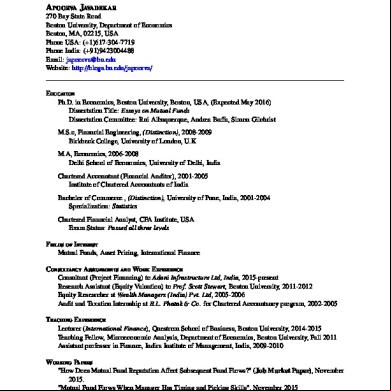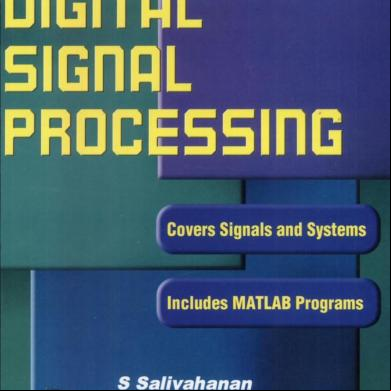Apoorva Javadekar- Cv 241g2o
This document was ed by and they confirmed that they have the permission to share it. If you are author or own the copyright of this book, please report to us by using this report form. Report l4457
Overview 6h3y3j
& View Apoorva Javadekar- Cv as PDF for free.
More details h6z72
- Words: 756
- Pages: 3
Apoorva Javadekar 270 Bay State Road Boston University, Department of Economics Boston, MA, 02215, USA Phone USA: (+1)617-304-7719 Phone India: (+91)9423004488 Email: [email protected] Website: http://blogs.bu.edu/japoorva/
Education Ph.D. in Economics, Boston University, Boston, USA, (Expected May 2016) Dissertation Title: Essays on Mutual Funds Dissertation Committee: Rui Albuquerque, Andrea Buffa, Simon Gilchrist M.S.c, Financial Engineering, (Distinction), 2008-2009 Birkbeck College, University of London, U.K M.A, Economics, 2006-2008 Delhi School of Economics, University of Delhi, India Chartered ant (Financial Auditor), 2001-2005 Institute of Chartered ants of India Bachelor of Commerce , (Distinction), University of Pune, India, 2001-2004 Specialization: Statistics Chartered Financial Analyst, CFA Institute, USA Exam Status: ed all three levels Fields of Interest Mutual Funds, Asset Pricing, International Finance Consultancy Assignments and Work Experience Consultant (Project Financing) to Adani Infrastructure Ltd, India, 2015-present Research Assistant (Equity Valuation) to Prof. Scott Stewart, Boston University, 2011-2012 Equity Researcher at Wealth Managers (India) Pvt. Ltd, 2005-2006 Audit and Taxation Internship at B.L. Phatak & Co. for Chartered ancy program, 2002-2005 Teaching Experience Lecturer (International Finance), Questrom School of Business, Boston University, 2014-2015 Teaching Fellow, Microeconomic Analysis, Department of Economics, Boston University, Fall 2011 Assistant professor in Finance, Indira Institute of Management, India, 2009-2010 Working Papers "How Does Mutual Fund Reputation Affect Subsequent Fund Flows?" (Job Market Paper), November 2015. "Mutual Fund Flows When Manager Has Timing and Picking Skills", November 2015 Work in Progress "Asymmetric Correlation in International Equity Markets" (with Rui Albuquerque), August 2015
Apoorva Javadekar Media & Presentations Article in Hindustan Times titled Puzzles in Globalization, 2013 Presented "Performance of Mutual Funds" at Gokhale Institute of Economics and Political Science, India, 2013
Professional Service: Referee for Finance Research Letters Computer Skills: Stata, Matlab, MS Office, and LATEX Citizenship: India (Visa F1) References Professor Rui Albuquerque Questrom School of Business Boston University 595 Commonwealth Avenue Boston MA 02215 USA Phone: +1-617-353-4614 Email: [email protected]
October 2015
Professor Andrea Buffa Questrom School of Business Boston University 595 Commonwealth Avenue Boston MA 02215 USA Phone: +1-617-353-4404 Email: [email protected]
Apoorva Javadekar How Does Mutual Fund Reputation Affects Subsequent Fund Flows? (Job Market Paper), November 2015 Paper offers a novel evidence that the link between recent mutual fund performance and subsequent fund flows is largely shaped by it’s reputation as measured by it’s prior long-term performance. Both sensitivity and level of fund flows increases in reputation. Particularly, for a fund with low level of reputation, flows are weakly responsive to recent performance. In short, return chasing is limited only for funds with strong reputation. When investors learn about unknown managerial quality and when update to beliefs are a function of signals only independent of priors as in the case of Gaussian signals, competitive capital markets imply that fund flows are completely determined by recent performance. In light of this, I explain the dependence of fund flows on reputation using presence of Inattentive Investors who are otherwise rational. Model additionally generates implications about performance persistence, impact of managerial replacements and fee structure. All the implications are confirmed in the data. Mutual Fund Flows When Manager Has Timing and Picking Skills, November 2015 Mutual fund manager can add value either by picking profitable assets and generating alpha or by timing the market by adjusting beta. While traditional theories have focused on alpha component of manager’s skill, I built a model where manager has both types of skills. This generates an interesting learning mechanism whereby what investors learn about manager depends not only upon managerial performance but market state as well. In particular, period of high (low) market volatility is informative about timing (picking) skills. Because investors value timing skills more during high volatile periods, mutual fund flows inherit cyclical nature implicit in learning mechanism. I test and confirm these predictions in the data. In particular, I show that fund flow sensitivity is increasing in magnitude of market movement as well as conditional volatility, that recessions being characterized by high conditional volatility are also the times with higher flow sensitivity and that funds with good timing skills experience higher capital flows when forecast volatility is higher. Asymmetric Correlations In International Equity Markets, (With Rui Albuquerque), June 2015, (Work in Progress) There is large evidence suggesting that global equity returns have higher correlations during recessions as compared to expansions. We show that similar pattern is observable for equity fundamentals like GDP growth or industrial production. We explore asset pricing implications of asymmetric correlations of fundamentals in a standard endowment economy.
Education Ph.D. in Economics, Boston University, Boston, USA, (Expected May 2016) Dissertation Title: Essays on Mutual Funds Dissertation Committee: Rui Albuquerque, Andrea Buffa, Simon Gilchrist M.S.c, Financial Engineering, (Distinction), 2008-2009 Birkbeck College, University of London, U.K M.A, Economics, 2006-2008 Delhi School of Economics, University of Delhi, India Chartered ant (Financial Auditor), 2001-2005 Institute of Chartered ants of India Bachelor of Commerce , (Distinction), University of Pune, India, 2001-2004 Specialization: Statistics Chartered Financial Analyst, CFA Institute, USA Exam Status: ed all three levels Fields of Interest Mutual Funds, Asset Pricing, International Finance Consultancy Assignments and Work Experience Consultant (Project Financing) to Adani Infrastructure Ltd, India, 2015-present Research Assistant (Equity Valuation) to Prof. Scott Stewart, Boston University, 2011-2012 Equity Researcher at Wealth Managers (India) Pvt. Ltd, 2005-2006 Audit and Taxation Internship at B.L. Phatak & Co. for Chartered ancy program, 2002-2005 Teaching Experience Lecturer (International Finance), Questrom School of Business, Boston University, 2014-2015 Teaching Fellow, Microeconomic Analysis, Department of Economics, Boston University, Fall 2011 Assistant professor in Finance, Indira Institute of Management, India, 2009-2010 Working Papers "How Does Mutual Fund Reputation Affect Subsequent Fund Flows?" (Job Market Paper), November 2015. "Mutual Fund Flows When Manager Has Timing and Picking Skills", November 2015 Work in Progress "Asymmetric Correlation in International Equity Markets" (with Rui Albuquerque), August 2015
Apoorva Javadekar Media & Presentations Article in Hindustan Times titled Puzzles in Globalization, 2013 Presented "Performance of Mutual Funds" at Gokhale Institute of Economics and Political Science, India, 2013
Professional Service: Referee for Finance Research Letters Computer Skills: Stata, Matlab, MS Office, and LATEX Citizenship: India (Visa F1) References Professor Rui Albuquerque Questrom School of Business Boston University 595 Commonwealth Avenue Boston MA 02215 USA Phone: +1-617-353-4614 Email: [email protected]
October 2015
Professor Andrea Buffa Questrom School of Business Boston University 595 Commonwealth Avenue Boston MA 02215 USA Phone: +1-617-353-4404 Email: [email protected]
Apoorva Javadekar How Does Mutual Fund Reputation Affects Subsequent Fund Flows? (Job Market Paper), November 2015 Paper offers a novel evidence that the link between recent mutual fund performance and subsequent fund flows is largely shaped by it’s reputation as measured by it’s prior long-term performance. Both sensitivity and level of fund flows increases in reputation. Particularly, for a fund with low level of reputation, flows are weakly responsive to recent performance. In short, return chasing is limited only for funds with strong reputation. When investors learn about unknown managerial quality and when update to beliefs are a function of signals only independent of priors as in the case of Gaussian signals, competitive capital markets imply that fund flows are completely determined by recent performance. In light of this, I explain the dependence of fund flows on reputation using presence of Inattentive Investors who are otherwise rational. Model additionally generates implications about performance persistence, impact of managerial replacements and fee structure. All the implications are confirmed in the data. Mutual Fund Flows When Manager Has Timing and Picking Skills, November 2015 Mutual fund manager can add value either by picking profitable assets and generating alpha or by timing the market by adjusting beta. While traditional theories have focused on alpha component of manager’s skill, I built a model where manager has both types of skills. This generates an interesting learning mechanism whereby what investors learn about manager depends not only upon managerial performance but market state as well. In particular, period of high (low) market volatility is informative about timing (picking) skills. Because investors value timing skills more during high volatile periods, mutual fund flows inherit cyclical nature implicit in learning mechanism. I test and confirm these predictions in the data. In particular, I show that fund flow sensitivity is increasing in magnitude of market movement as well as conditional volatility, that recessions being characterized by high conditional volatility are also the times with higher flow sensitivity and that funds with good timing skills experience higher capital flows when forecast volatility is higher. Asymmetric Correlations In International Equity Markets, (With Rui Albuquerque), June 2015, (Work in Progress) There is large evidence suggesting that global equity returns have higher correlations during recessions as compared to expansions. We show that similar pattern is observable for equity fundamentals like GDP growth or industrial production. We explore asset pricing implications of asymmetric correlations of fundamentals in a standard endowment economy.










